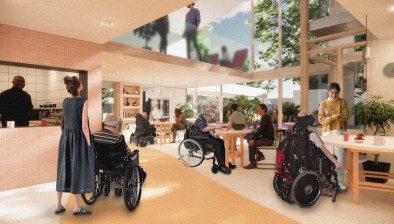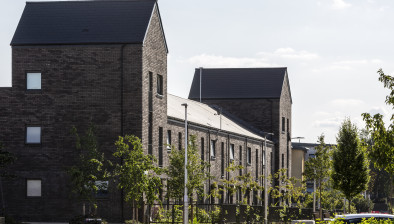Next generation of affordable homes ‘too small for wheelchairs’
 Many of the 50,000 new affordable homes which the Scottish Government has pledged will be delivered by 2021 will be unsuitable for disabled and elderly people, according to the government’s own research.
Many of the 50,000 new affordable homes which the Scottish Government has pledged will be delivered by 2021 will be unsuitable for disabled and elderly people, according to the government’s own research.
Ministers have committed to invest £3 billion in building at least 50,000 new properties by 2021, with the aim of tackling the nation’s chronic housing shortage.
But, according to inews.co.uk, research commissioned by the government has found that this next generation of affordable homes will be too small for many disabled people who rely on wheelchairs or other mobility aids as the standards being followed do not allow sufficient floor space for wheelchairs.
The oversight was highlighted by the charity Inclusion Scotland after an investigation by inews.co.uk revealed that almost 10,000 disabled people across the country are waiting for more suitable council houses.
Figures from 26 of Scotland’s 32 local authorities showed that some have been waiting for decades to move, with one disabled person in Stirling first requesting a change of property in 1969.
Inclusion Scotland said a lack of accessible housing around the country was leaving disabled people “trapped” in their own homes, describing the situation as “unacceptable”.
Although 35,000 of Scotland’s 50,000 planned affordable homes are being built to construction guidance called “Housing for Varying Needs”, this does not take into account the extra floor space needed by people who use wheelchairs or mobility aids.
Research commissioned by the Scottish Government from architects Anderson Bell + Christie highlighted the problem, but Inclusion Scotland it had still not been acknowledged by ministers.
In their report in May last year, the authors said the Housing for Varying Needs guidance will improve the accessibility of most homes, but added: “None of these ‘barrier-free’ standards offer full accessibility for wheelchair users, as this would involve a significant increase in floor area.”
They continued: “While there are ‘pockets’ of expertise in housing for wheelchair users, there is confusion and some complacency as to what constitutes wheelchair design standards.
“Often homes designed to accessible, barrier-free design standards are seen as suitable for wheelchair users without an understanding of their greater space requirements.”
Inclusion Scotland is calling for ministers to set a national target for new build developments, with the aim of making at least 10 per cent of their properties wheelchair accessible or easily adaptable.
“Being unable to buy or rent a sufficiently accessible home can leave disabled people trapped – in their own homes, in hospital, or in residential care against their will. This is simply unacceptable in today’s society,” said the charity’s chief executive Dr Sally Witcher.
“Put simply, we are not building or adapting enough houses in Scotland to keep pace with the current housing needs of wheelchair users and those who use mobility aids, let alone enough to anticipate the projected growth in these needs of an ageing population.
“We need more homes that are built to more generous wheelchair accessible standards and we need them now.”
Scottish Labour’s housing spokeswoman Pauline McNeill said it was “truly shocking” that ministers had apparently ignored the advice of the research they had commissioned.
Housing minister Kevin Stewart said: “We want disabled people in Scotland to live life to the full in homes built or adapted to enable them to participate as full and equal citizens.
“Our Disability Delivery Plan, launched in December 2016, set out a number of housing related commitments that support this ambition.
“Work is underway to develop guidance for local authorities and other stakeholders on the need to set a realistic target for the delivery of wheelchair accessible housing across all tenures.
“This will be incorporated into the Local Housing Strategy guidance, which will be reviewed later this year.”









